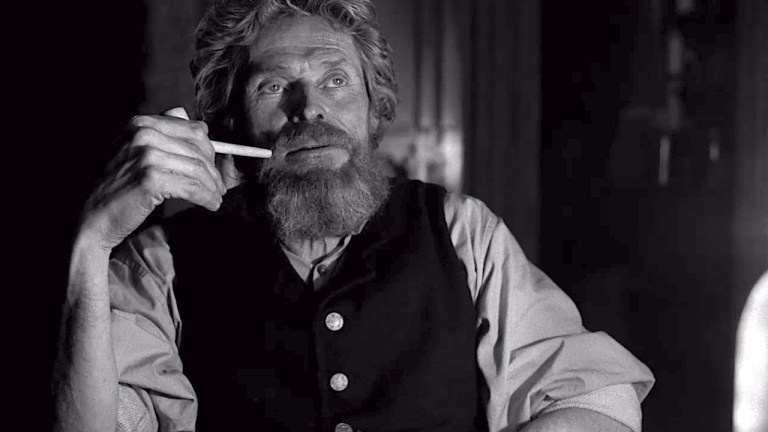The Lighthouse interview: Willem Dafoe talks Robert Pattinson, Farts and eating dirt
Star of Robert Eggers' fascinating horror The Lighthouse chats about what it took to make a tense two hander beset by blustery squalls

The Lighthouse from The Witch director Robert Eggers is a lyrical, nightmarish two hander which pits Willem Dafoe’s veteran ‘wickie’ against his new young assistant, played by Robert Pattinson, tending a lighthouse on a remote island in New England.
It’s a horror movie that wraps in nautical, classical and literary references and an intense decent into hell for the two characters, elevated by incredible performances from both.
We sat down with Willem Dafoe to hear about the ordeal of the shoot, his odd on-set relationship with Pattinson and going method during the fart scenes…
Warning: Here be spoilers!
Can you tell me a bit about how you felt when you first read the script?
Good! You know, whenever I look at a script I ask myself ‘do I want to do these things?’ And I did! And also, I like the fact that the language was an elevated language, wasn’t normal, was very beautifully written. I know in reading the script that I’d have to prepare some things like an accent, that I’d have to grow a beard, I knew I’d want to alter my physical self some way.
So there were many things that attracted me but I think the main thing is the script came to me because I spoke with Rob Eggers, after seeing The Witch and said I’d love to work with you. This was his response. So I was looking to work with him because I think he’s a really special talent. Then when he gives me this two-hander, I knew I’d have plenty to do and I knew it would be interesting.
When you asked yourself ‘do I want to do this?’ how aware were you that it would be in these extreme weather conditions, and that a lot of it would be for real?
We’re you’re sitting in your warm apartment you can be very brave! So, it sounds like an adventure, it sounds cool. It’s not comfortable, but at the same time, it’s the only way to do something like this. And of course, the weather is a huge, huge part of the movie and you just accept it and you love it actually, because the weather tells you how to perform, it tells you what the story is. It’s also the thing that routes it from being just a bullshit little tale and makes you have some skin in the game.
You have to deal with it and in someway, that’s the thing that ties you to one of the, let’s call it themes in the story, which isn’t really articulated, but you know, nature is very important in the story. How you deal when you’re really cold, when that weather scares you, when things turn on a dime. That’s all part of it. So if you’re really experiencing that, it helps with the pretending.
The dialect and your dialogue was really interesting with a mix of nautical poetry and classical references – how did you approach it?
Robert Eggers is like a freak with research, so he made a lot of that available to me. Videos of interviews with light housekeepers, some vintage footage of rescues at lighthouses, of the weather at certain lighthouses, also a lot of tapes with different accents from different regions.
So I’m reading all this stuff, I’m listening to all this stuff and we’re trying all kinds of accents, trying them for music, trying them for flavour and we tried lots of different things, but the truth is he wrote an accent with those words. And in the end, the one that we felt most comfortable with was – it’s always a little bit of an invented accent – but the thing that guided us was a West Country accent. Very similar to the classic pirate accent of Robert Newton, but not exactly thinking of him.
When you read that text it’s written that way, I couldn’t do it any other way. And similarly, you read that text, and you just find a pitch in your voice that you feel most comfortable with. It’s like, if you speak another language. I find my voice changes when I speak in Italian, because that becomes the key, that becomes the tone that’s good for my ear that makes me feel confident, makes me glide through things. Well, it’s similar like this. I find the accent, I match it with a tone. Then that helps transport you to feel like another person and helps you be the text. Be the text because it’s a beautiful text pieced together from all these references, but it doesn’t necessarily feel like that. I only know that because he said, we liberally stole from Melville and Milton, this Maine writer Sarah Orne Jewett that’s where a lot of stuff comes from.
I’ve taken to saying ‘Says I!’ at the end of sentences – it gives me pleasure.
There is pleasure in that!
Thomas is an interesting character, at the start he’s a man but towards the end becomes something more mythical or even demonic – did you have to take a different approach with him to more traditional roles?
I don’t know what the answer to that is. I tend to play the scenes, I don’t like to anticipate the arc of the character. I play the scenes in the same way that when you’re painting you do one brushstroke at a time and the brushwork speaks to each other and then it sends you someplace. I feel that’s the same thing with a scene.
I think, for me anyway, it gets me too involved in prefiguring things to pace or imagine where I’m going to go. I’m all for jumping off the cliff a little bit and playing the scenes and and then the way they play off of each other will be the way of the character. That’s what you need a director for to just be watching these things and make sure that things are heading in the right direction.
What were the toughest scenes to shoot for you?
It’s a spoiler, so you can deal with it however you like. But it’s really difficult to do a speech when someone’s throwing dirt on your mouth!
That was really uncomfortable to watch.
It was uncomfortable to do! But beautifully so, because it’s like you give people the conditions and just with a little abstraction it doesn’t take much to imagine the real thing because you’ve got the sensation of it so much that it’s kind of like no acting required!
It’s a two-hander and there are obviously really intense scenes with Robert Pattinson. How was it working with him and did your relationship change during the shoot?
I think it changed after the shoot. We didn’t really talk or hang out much when we were shooting and now that I know [him] a little bit as we do some press, it’s like, ‘man why didn’t you talk to me before!’ Because in many ways, he’s a very pleasant guy and I enjoy talking to him. But during the shoot, we spoke very little. And I think some people as we do press, a lot of people have been made making a lot of our different processes, which wasn’t a big deal. It’s just, we have very different characters. I mean, you see the movie through his eyes, and particularly in the beginning, he has a lot of tasks. And I’ve got a lot of the text and the text is you know, quite particular so I had to do a certain amount of rehearsal and I’m kind of like the motor. So I had to have some tricks up my sleeve, where he really felt like he didn’t want to do anything in rehearsal until the camera was rolling, he didn’t want to present anything, or feel anything – he thought it would lose its spontaneity, its life.
I come from the theatre and part of your whole training is you can structure something, you can rehearse something, but every time it’s different, and you’ve got to reanimate things, even if it’s structured and you know what the action is, how it’s realised is different every time. So I tended to be happy for rehearsal in preparation and I think he really was not interested in that at all, which was fine because he’s a reactive character for the most part. And so when he’s there, and these things are working on him, he finds his way in that moment.
There are a lot of physical scenes between you. Were you able to improvise a little bit more with that aspect?
A little bit but when we’re fighting and things like that, that has to be worked out just because the camera language is so specific. In fact the other thing that was unique about this process is when we did the little rehearsal that we did the camera was set first. Usually the actors would do the scene and then you’d set the camera. But in this case, it’s like this is the shot, and our job is to fit into the structure of that shot.
The other thing that is worth talking about is, this is a film where the shots are so designed, and there’s no coverage. So that also affects how you perform because basically, you got one chance. You don’t have the insurance of another angle to cut to, because that’s not in the programme because they know from the designed shots that it’s going to go from this shot, to this shot, to this shot. That’s not to say the great editor Louise [Ford] didn’t make some choices but there wasn’t coverage shot so that really affects how you perform.
You also have a lot of fart scenes…
Are you’re gonna ask me how much was real?! I say half. My answer is half and half.
And people wonder why you didn’t talk to Robert Pattinson more…
All that greasy fish…
I wanted to ask what your interpretation of the end of the film is – there’s so much going on…
You know, I don’t know. I don’t know. It’s not that I don’t care. But it’s one of those things that that floats for me. The film, the film expresses many important things to me. But what it says in the end, I can’t quite articulate. Which might sound like a coward’s answer.
But I really don’t know. I mean I don’t need to know. Because it happened to me. It happened to me as an audience. It’s kind of just the whole push, you know, basically. You got these guys that are put in this situation that’s like a purgatory and then the little personality, the little sense of self that they’ve created for themselves starts to get stripped away. You see what their real nature is and that points them into a kind of desperation that leads them to the liquor and the fantasy and all this stuff going on and it turns murderous and destructive because of the male toxicity of it all and it doesn’t work out for either of them.
So I don’t want to tell anyone what it means or what the moral of the story is because that’s going to be different for everybody. But clearly don’t go down that road.
Don’t take a job as a lighthouse keeper with me!
The Lighthouse is out now in UK cinemas
